World Geography And Politics Daily News | 20 Jun 2023

Views (140)
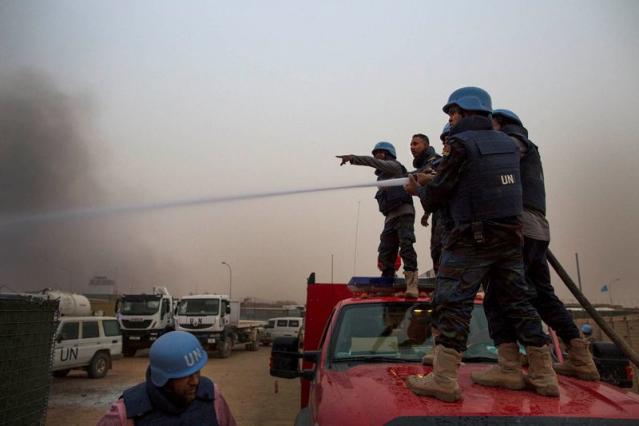
Xi Jinping hails progress after meeting with Antony Blinken
Chinese president Xi Jinping hailed “progress” in relations with the US after a rare visit from secretary of state Antony Blinken aimed at halting a slide towards conflict.
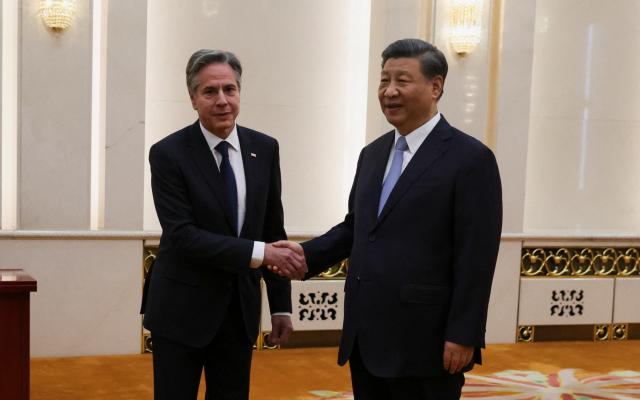
Using notably positive language, Mr Xi said it was “very good” the two nations reached agreements on “some specific issues”, without specifying which.
Mr Blinken’s visit, the first by the US’s top diplomat since 2018, ended without an agreement to restart communication between the military leaders of the two nations, a key goal for the White House.
Joe Biden said Mr Blinken “did a hell of a job” in his rare visit to Beijing. The US president added: “We’re on the right trail here.”
Washington views direct communication as key to avoiding mishaps over Taiwan or in the South China Sea that could spark physical clashes between the world’s largest economies.
Earlier this month, a Chinese navy ship sailed within 140 metres (459 feet) of a US Navy destroyer in a near-collision, the second close encounter between the two militaries within a fortnight.
However, after a 35-minute meeting in Beijing’s Grand Hall of the People, Mr Blinken said he had agreed with Mr Xi to try and “stabilise” relations, which have been marred by clashes over spy balloons, Taiwan, Ukraine and human rights.
In a press conference after the meeting, Mr Blinken spoke positively about an agreement to try and curb the supply of fentanyl into the US.
“I raised as a priority the issue of opiates and fentanyl,” he said. “We agreed to set up a working group or joint effort to shut off the flow.” The synthetic drug has wrought havoc across the US over the last decade.
“China’s messaging has been pretty positive,” said Wu Xinbo, a professor and director at the Center for American Studies at Fudan University, in Shanghai.
“China showed that it still hopes to work with the US to stabilise and improve relations. I think that while China is not optimistic about Sino-US relations, it has not given up hope either.”
Earlier on Monday, Mr Blinken met for three hours with China’s top foreign policy official, Wang Yi.
Mr Wang presented an ultimatum on Monday, saying the US must choose between “cooperation or conflict”.
“It is necessary to make a choice between dialogue and confrontation, cooperation or conflict,” Mr Wang told Mr Blinken, according to a readout from Chinese state media.
Mr Blinken said that the US had set limited objectives for the trip, and mostly achieved them. It was hoped the visit would pave the way for more visa access and flights between China and the US.
Both countries said Sunday that Mr Qin had accepted an offer to visit the US at a later date.
Mr Blinken emphasised “the importance of diplomacy and maintaining open channels of communication across the full range of issues to reduce the risk of misperception and miscalculation”.
Meanwhile, Chinese Premier Li Qiang started a visit to Germany and France on Monday that comes as Europe seeks to balance concerns over economic dependence on China and about its stance toward Ukraine and Taiwan with a desire to engage Beijing on issues such as climate change.
The Bank of England must pay for wrecking Britain’s economy
It is hard to know whether Mark Carney’s latest outburst should be greeted with derision or dismay. The former Bank of England governor’s claim that Brexit is to blame for Britain’s sticky inflation is such arrant nonsense that one wonders whether Carney is suffering from a case of managerial messianism.
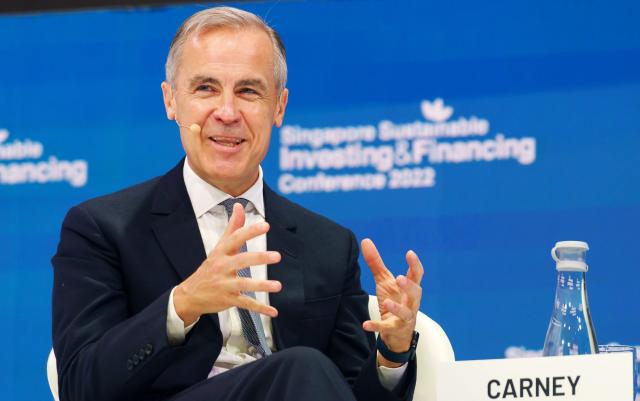
Perhaps he deserves our sympathy. In a world where bureaucrat economists hold as much mystical power over court as the Renaissance Magi, it is hardly surprising that Carney should tragically mistake his confirmation bias for prophetic gift. Then again, it had previously been speculated that Canadian Carney covets Justin Trudeau’s job. Perhaps, then, poor old Brexit has got mud in the eye as the popinjay puffs his feathers, eagerly brandishing his liberal credentials to his peers across the pond.
Truth be told though, Carney’s deflections should be treated with the utmost seriousness. What better evidence that the system is pathological than the sight of its principal actors declining to such lows? What better corroboration that the system is kaput than the reality that all hope of reflection or reform has already been lost in a mist of dissembling obfuscation? What clearer sign that Threadneedle Street has tipped into institutional insanity than its continued devotion to New Keynesian models that, in their inability to acknowledge a link between money supply and inflation, have helped plunge Britain into a cost of living quagmire?
In short, things are even worse than the most bitter of cynics might suspect: the British government machine, having been rendered inoperable, is now but a stage for soothsayers.
The Bank’s latest disastrous chapter is but the culmination of years of mismanagement and dysfunction. Under the incumbent Andrew Bailey, it has further degenerated into a finishing school for Treasury apparatchiks conditioned into the same orthodox worldview. A cosmetic bid to improve the Bank’s diversity by recruiting people from ethnic minority backgrounds has failed to stamp out groupthink.
Meanwhile, the Bank’s secretive tradition has been jealously preserved, with Threadneedle Street deigning to only release transcripts of meetings after eight years. (It might be suggested that these would reveal just how many of its members lack a grasp of basic macro-economics).
And now we are where we are: the Bank is expected to hike rates a further quarter this week, and up to 6 per cent by next year. This could well trigger a painful recession, or even a full-blown financial crash as mortgage-owners default or Britain’s zombie companies kept on life support finally implode en masse.
If the Westminster system was not utterly psychopathic, then there would at this point be a reckoning. It is clear that the Government should launch on official inquiry. Bailey should be sacked, the Monetary Policy Committee gutted, the Treasury’s power of appointments terminated and monetarists installed to challenge the New Keynesian consensus. And this is just the tip of the iceberg: for the Bank’s macro-economic groupthink is merely an excrescence of an intellectual crisis that engulfs the entire economics discipline.
The biggest tragedy of wokeish academic post-modernism, with its quest to decolonise history, literature and the arts, is that it completely missed the mark. It is the soft sciences – and above all economics – where obsolete orthodoxies and arrogant assertions of objective truth need to be urgently overthrown. It is not the statues of slavers but rather New Keynesianism’s sacred canon of icons and assumptions that needs to be burned to the ground.
And yet it is clear that the Bank is utterly unaccountable. One can’t help but suspect that Downing Street has calculated that it is better to back Threadneedle Street than risk speculation about the Government’s role in supporting the Bank’s money printing activities when Sunak was chancellor. The Bank has thus likely got away with its failings. Bailey will likely keep his job. Carney’s vaporously clean reputation will remain unsoiled. New Keynesianism, known for its impressive flexibility in the face of “anomalies” will live on, incorporating new assumptions. In the country’s most prestigious economics departments, professors will continue to avoid undermining the credibility of dominant macro-economic methodologies, out of fear that it will compromise their tenure.
That the Bank and the intellectual apparatus behind it are almost certainly off the hook is all the more impressive considering that they have probably lost the Government the election. After all, any hope of a Tory comeback has been liquidated by the looming inflationary mortgage crisis, which has seen the two-year fixed-rate mortgage average already reach more than 6 per cent.
What is all the more depressing is that we have been here before. Lest we forget, the Bank’s chaotic handling of the financial crisis revealed an archaic and intellectually conceited organisation that, in its captivity to groupthink, failed to anticipate the economic meltdown triggered by the collapse of Northern Rock. In other words, the system has for some time been stuck in a doom loop, dangerously incapable of error-correction.
Apparently a cost of living crisis, historic inflation and a potential electoral wipeout is not enough to bring about a proper reset. And round and round we go, until we are hit by a crisis that even the untouchable Bank can’t recover from.
Water wars: Afghanistan and Iran’s deadly border flare-up spotlights scarcity crisis
Iran and Afghanistan are going head to head over control of the supply of a crucial resource that’s shrinking by the day: water.
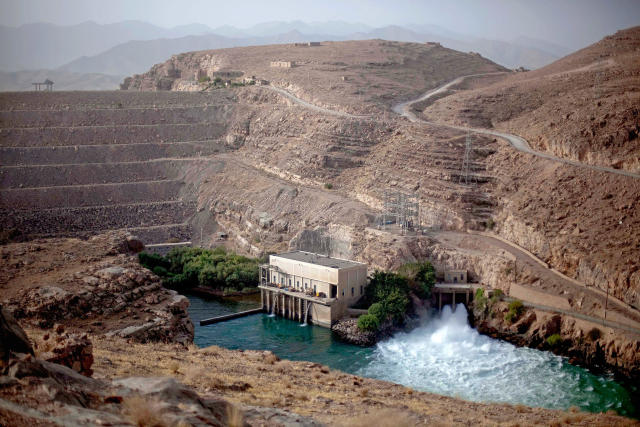
Violence along the border between the two tumultuous countries flared up in recent weeks, stoked by a dispute over the water flowing from Afghanistan’s Helmand river into Iran. Tehran says Afghanistan’s Taliban government is deliberately depriving Iran of sufficient water supplies in order to bolster its own; but the Taliban says there isn’t enough water anymore to begin with, thanks to plummeting rainfall and river levels.
Iranian and Afghan border guards clashed on May 27, exchanging heavy gunfire that killed two Iranian guards and one Taliban soldier and wounded several others. Both sides blame each other for provoking the fighting, which has thrust the region’s water issues back into the spotlight.
The situation risks destabilizing an already poor and water-deprived part of Iran, where serious protests against the government have taken place in recent years.
“The water dispute with Afghanistan is not something Iran can take lightly,” Torbjorn Soltvedt, principal Middle East and North Africa analyst at Verisk Maplecroft, told CNBC. “Water resources in Iran are under severe pressure and water stress has been a trigger of large-scale civil unrest in recent years.”
In the summer of 2021, protests began in Iran’s western Khuzestan province over water shortages and subsequent power outages as hydroelectric power stations ran out of supply. Dubbed “the uprising of the thirsty,” the demonstrations soon spread to several cities around Iran including the capital, Tehran, and drew a heavy government crackdown that ended in both police and civilian casualties.
Grappling with U.S. sanctions, a severely weakened economy and a continuing anti-government protest movement, Iran is already under significant pressure. “With the authorities still struggling to keep a lid on nationwide protests,” Soltvedt said, “a water security crisis in eastern Iran would come at a particularly bad time.”
The 580-mile border between Afghanistan and Iran is porous and crawling with crime, predominantly coming from the Afghan side into Iran. Afghanistan has been wracked with instability and war for decades, and the ruling Taliban government derives a significant part of its revenue from illicit trades.
“Iran’s Afghan border has always been its most vulnerable,” said Kamal Alam, a nonresident senior fellow at the Atlantic Council’s South Asia Center. It’s host to “a number of issues including narcotics smuggling, human trafficking, and terrorism” — but is simultaneously an all-important source for water, Alam said.
Water tensions between the two countries go way back. In the 1950s, Afghanistan built two major dams that limited the flow of water from the Helmand river into Iran. This angered Tehran and threatened relations, ultimately leading to the signing of a treaty in 1973 that allotted Iran 850 million cubic meters of Helmand water yearly.
But subsequent revolutions, invasions, wars and dramatic government changes in both countries meant the treaty was never fully implemented.
“Since the 1973 water treaty between the two, they have come close to war a number of times due to various Afghan governments using Iran’s water vulnerability as a leverage on bilateral issues,” Alam said.
Scientists have long warned that climate change increases the risk of wars and refugee crises as countries fight over the natural resources they need to live.
“The disagreements over water allotments for the Helmand River are hard to overcome because neither country has the ability to bring more water to the region,” said Ryan Bohl, a senior Middle East and North Africa analyst at Rane. “It’s already an extremely dry area, but issues like climate change and overfarming are making it worse.”
“In a way,” he said, “it’s a classic driver of conflict, a competition for a scarce resource neither side can live without.”
In mid-May, a Taliban press release expressed Afghanistan’s support for the 1973 treaty, but said: “Since there has been a drought in Afghanistan and the region in recent years and the water level has dropped … provinces of the country are suffering from drought and there is not enough water. In such a situation, we consider Iran’s frequent demand for water and inappropriate statements in the media as harmful.”
Iranian President Ebrahim Raisi, in response, told Afghanistan’s leaders to take his words “very seriously,” saying “I warn the rulers of Afghanistan to give the rights of the people in [the Iranian border regions of] Sistan and Baluchistan immediately.” A Taliban commander hit back, saying there was no water for them to give Iran and warning, “Do not attack us. We are not afraid.”
Tehran then made a statement emphasizing the fact that it doesn’t recognize the Taliban as Afghanistan’s ruling body. The back-and-forth only heightened tensions, and some worry that May’s border shootout could be a sign of worse to come.
Rane’s Bohl expects the issue to fester as “water scarcity is a very complicated problem that requires extensive and expensive infrastructure investments to overcome, neither of which heavily-sanctioned Iran or Afghanistan is in a position to fix,” he said.
He expects flare-ups between the two to continue, as well as continued interruptions to Afghanistan’s water supply — bad news for an already desperately impoverished country.
That “could harm Afghanistan’s farming output over time and damage its already frail economy and worsen food shortages,” Bohl said.
Houston rapper Big Pokey dies after collapsing at show in Texas
Milton Powell, a Houston rapper who performed under the name Big Pokey and is credited with elevating the city's hip-hop scene, died after collapsing during a show in Texas, a local official said Monday. Tom Gillam III, a justice of the peace in Jefferson County, where Powell was performing when he collapsed Sunday, said an autopsy to determine the cause of death was pending. Powell was a member of Houston's rap collective Screwed Up Click that was formed by the late DJ Screw.

HOUSTON (AP) — Milton Powell, a Houston rapper who performed under the name Big Pokey and is credited with elevating the city's hip-hop scene, died after collapsing during a show in Texas, a local official said Monday.
Tom Gillam III, a justice of the peace in Jefferson County, where Powell was performing when he collapsed Sunday, said an autopsy to determine the cause of death was pending. He said Powell was 48.
A statement on Powell's official Instagram page said he was "well loved by his family, friends, and his loyal fans."
Tributes from other artists poured in across social media.
Rapper Bun B called Powell “one of the most naturally talented artists" in Houston.
“He’d pull up, do what he had to do and head home. One of the pillars of our city,” Bun B said on Instagram.
Uganda ADF school attack: I covered myself in blood to hide
A student tells the BBC he survived an attack by suspected Islamist rebels by pretending to be dead.
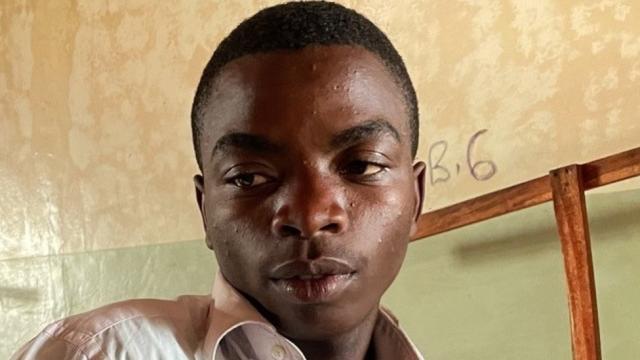
Student Julius Isingoma has told the BBC how he miraculously survived a night-time assault by suspected Islamist rebels on his school dormitory in western Uganda.
"I smeared the blood of my dead colleagues in my mouth, ears and on my head so that the attackers would think I was dead," he said, when we met him at Bwera General Hospital in Kasese district.
About 40 people - 37 of them students - died in the attack on the secondary school in the small town of Mpondwe on Friday night.
Uganda's President Yoweri Museveni blamed the attack on the Allied Democratic Forces (ADF), adding that they were "possibly working with other criminals because I hear that school had some wrangles". He did not elaborate, but vowed to hunt down the militants in their hide-outs across the border in the Democratic Republic of Congo.
The ADF has not yet commented.
It was formed in the 1990s and took up arms against Mr Museveni, alleging persecution of the minority Muslims population.
Its leader reportedly pledged allegiance to the Islamic State (IS) group in 2016.
But it was not until April 2019 that IS first acknowledged its activity in the area, when it claimed an attack on army positions near the border with Uganda.
This statement marked the announcement of IS's "Central Africa Province" (Iscap).
Six students are believed to have been abducted as the militants retreated to DR Congo.
Julius was among six people who managed to survive the assault which lasted for several hours.
He did not identify the attackers, but said they were gun-wielding men who launched their attack at about 22:00 local time.
They came to the boys' dormitory but the students had locked it after realising they were in danger.
"When they couldn't open the door they hurled a bomb inside the dormitory and then used hammers and axes to break down the door," he said.
Julius was standing behind many of the students who had formed a shield near the door and were shot dead when the militants got into the dormitory.
There were cries as the students were gunned down, hacked or shot to death.
He quickly climbed to the top of a bunk bed, removed some of the wooden planks of the ceiling, and jumped inside to hide.
From there, he helplessly watched his colleagues being brutally murdered by the assailants, who then set fire to mattresses and left.
"I was overwhelmed by the smoke and dropped back down into the dormitory with a thud," he said.
The militants heard the thud and came back.
It was at that point that Julius knew he had to come out of the attack alive.
"I lay next to the bloodied bodies of my friends and thought very fast. Then I smeared a lot of blood into my ears, mouth and on my head and when the militants came, they checked my hand for a pulse and left," Julius said.
Another survivor, Godwin Mumbere, was in the same dormitory as Julius.
The 18-year-old recalled the assailants going to the girls' dormitory, dragging them out and hacking them to death with machetes.
They then came to the boys' dormitory, broke down the door and started attacking the students.
The bed Godwin was hiding under was overturned and his friends who were on top fell to the ground and were killed.
"The attackers saw me but thought I was dead," he told the BBC.
But they went out and came back into the dormitory to ensure everyone was dead.
"It was at this point that they shot me in the hand and set the dorm ablaze," he said.
Godwin was brought back to reality by the shouts of another student who said they were dying.
He ran out of the dormitory, scaled the school gate and ran to a nearby hardware store through a cocoa plantation. He got to a lodge and hid under a vehicle until he was rescued.
Clarice Bwambare, the senior administrator of Bwera General Hospital, told the BBC they started receiving the bodies of students and residents at around 01:00 - about three hours after the attack started on Friday night.
He noted that out of the 20 bodies they received, 18 were those of students.
Five survivors are currently recuperating at the hospital. One of them is a girl who is in critical condition at the intensive care unit. A surgeon advised that she cannot be moved because of a severe head injury from being hit with a hammer by the rebels.
Mr Bwambare said only one body had not been claimed from the mortuary.
On Sunday, grief-stricken families buried 21 of the students, according to Uganda's New Vision newspaper.
Lying on his hospital bed, Julius expressed regret that he could not attend their funerals. He said he wished he was a soldier who could fight back and save the lives of his friends and colleagues.
US urges 'orderly, responsible' drawdown of UN peacekeepers from Mali
Mali's Foreign Minister Abdoulaye Diop made the request during a U.N. Security Council meeting on Friday, citing a "crisis of confidence" between Malian authorities and the decade-long U.N. mission known as MINUSMA. "The United States regrets the transition government of Mali’s decision to revoke its consent for MINUSMA," State Department spokesperson Matthew Miller said.
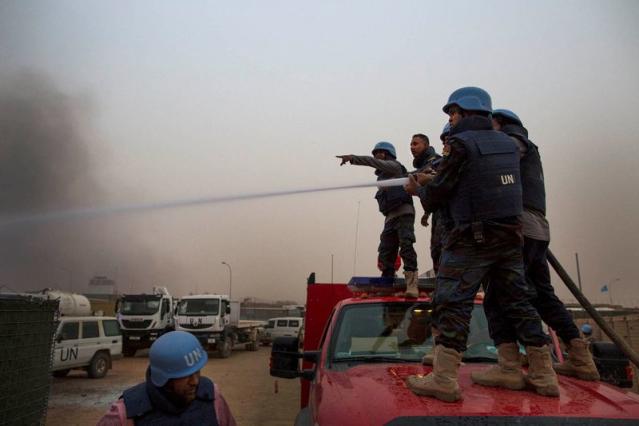
(Reuters) - The United States regrets a decision by Mali's interim military authorities to ask a United Nations peacekeeping force to leave the country, the State Department said on Monday, calling for an "orderly and responsible" drawdown of the mission.
Mali's Foreign Minister Abdoulaye Diop made the request during a U.N. Security Council meeting on Friday, citing a "crisis of confidence" between Malian authorities and the decade-long U.N. mission known as MINUSMA.
"The United States regrets the transition government of Mali’s decision to revoke its consent for MINUSMA," State Department spokesperson Matthew Miller said. "MINUSMA's drawdown must be orderly and responsible, prioritizing the safety and security of peacekeepers and Malians."
"We are concerned about the effects this decision will have on the security and humanitarian crises impacting the Malian people," he said in a statement.
Mali has struggled to stem an Islamist insurgency that took root following an uprising in 2012. MINUSMA was deployed by the U.N. Security Council in 2013 to support foreign and local efforts to restore stability.
Frustrations over the growing insecurity spurred two coups in 2020 and 2021, and the ruling junta has been increasingly at loggerheads with MINUSMA and other international allies, including France.
The junta has burned bridges with traditional Western allies and turned to Russia for help boosting its military capabilities.
The United States "will continue to work with our partners in West Africa to help them tackle the urgent security and governance challenges they face," Miller said. "We welcome further consultations with regional leaders on additional steps to promote stability and prevent conflict."
U.N. Security Council members had started to discuss a draft resolution to extend MINUSMA's mandate, which expires on June 30. It was unclear what would happen now.
The U.N. special envoy to Mali, El-Ghassim Wane, said on Friday it would be "extremely challenging, if not impossible" to operate in a country without the government authorities' consent.
(Reporting by Michelle Nichols and Daphne Psaledakis; Editing by Franklin Paul and Jonathan Oatis)
0 Likes
